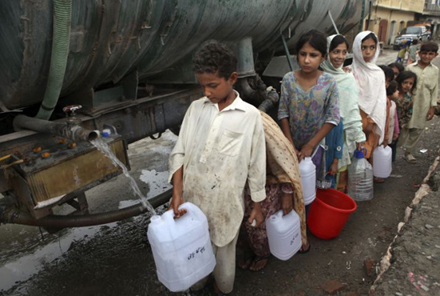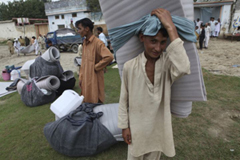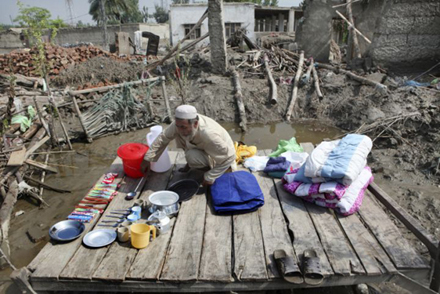Navigation
Pakistan: Doctors Without Borders/Médecins Sans Frontières (MSF) and Others Working to Avoid Disease Outbreaks
In the aftermath of a disaster that arrives as suddenly as the flooding in Pakistan did, the immediate impact—the deaths and the injuries—is usually followed by additional health risks caused by the difficult living conditions, the lack of hygiene, and the restricted access to clean water and basic health care services the disaster leaves in its wake.
 |
| Children collecting badly-needed clean water at an MSF water distribution point in Nowshera. Photograph Pakistan 2010 © Ton Koene |
In the aftermath of a disaster that arrives as suddenly as the flooding in Pakistan did, the immediate impact—the deaths and the injuries—is usually followed by additional health risks caused by the difficult living conditions, the lack of hygiene, and the restricted access to clean water and basic health care services the disaster leaves in its wake. This is, indeed, the case in Pakistan now, and Doctors Without Borders/Médecins Sans Frontières (MSF) and others are at present working hard to stave off outbreaks of disease and to provide essential health care to a population sorely in need of it.
 |
| MSF Responds todevastating floods. Ohotograph by Jean-Marc Jacobs for MSF |
From the outset of the current crisis, MSF continued providing health care in its existing programs in Khyber Pakhtunkhwa and Baluchistan provinces. Simultaneously, MSF also began expanding its activities to new health structures and set up mobile clinics in Pakistan’s two other provinces, Sindh and Punjab, when the flooding spread.
Currently, the most common diseases seen in MSF clinics are clearly linked to the difficult living conditions and the lack of access to clean water. “Out of more than 10,000 consultations in the last two weeks, the most common diseases we are treating are skin infections, respiratory diseases and acute diarrhea,” said Dr. Ahmad Mukhtar, MSF’s medical coordinator in Pakistan.
“Among those patients, there are some suspected cholera cases, and while we wait for official confirmation, we continue to provide them with the necessary treatment.”
In the eight mobile clinics MSF is running in Pakistan, around 10 percent of the 10,000 patients seen so far have been treated for Acute Watery Diarrhea. In Khyber Pakhtunkhwa’s Swat district, to take one example, medical teams have carried out a total of 321 consultations and admitted 24 people to MSF’s Diarrhea Treatment Center in Mingora Hospital.
Cholera is endemic in some parts of Pakistan, including in flood affected areas of Khyber Pakhtunkhwa, so some new cases would not be very surprising. In Lower Dir district, for instance, MSF treated 2,500 patients during a cholera outbreak in August 2009.
Cholera is a disease that one contracts by ingesting infected water or food. It can spread very easily in unhygienic conditions. Once contracted, cholera prevents one’s body from retaining water, leading to high-volume diarrhea and rapid dehydration. The disease can be countered, however, with oral rehydration salts or, in more severe cases, intravenous drips.
“Cholera is one of the severe forms of acute diarrhea,” says Dr. Mukhtar. “However, a few suspected cases do not mean that we’re on the verge of an outbreak. We need to remain very vigilant and make sure that we keep identifying and treating people with acute diarrhea as soon as possible. We treat people with acute diarrhea exactly as if they had cholera. Our staff in mobile clinics and in hospitals play a vital role in identifying and following up possible cases in the community.”
 |
| MSF distributes relief items in Malakand district. Photograph Pakistan 2010 © Ton Koene |
The floods and the ongoing rainfall make the situation more challenging because people still have limited access to clean water even as the overall hygiene situation continues to worsen. For this reason, MSF teams are working hard to better people’s living conditions and to provide them with access to clean water.
Every day, MSF provides more than 300,000 liters of clean water to affected communities in different parts of the country. In places such as the Nowshera and Charsadda districts of Khyber Pakhtunkhwa, water tanks are placed in different neighborhoods and regularly refilled. In other places—Swat, for instance—MSF works with the community to make sure water is provided and shared at different places where people gather, such as mosques and schools.
 |
| On the ruins of what used to be his home, a man lays out items received during an MSF non-food item distribution at a camp between Peshawar and Charsadda. Photograph Pakistan 2010 © Ton Koene for MSF |
Throughout Pakistan, MSF has distributed different kits to more than 50,239 people. In Fadfedar Canal in Baluchistan, distributions of hygiene kits and cooking sets have also included chlorine tablets to clean water and mosquito nets to prevent malaria. Health promotion activities are carried out in conjunction with these distributions, during which people are advised how to best purify water with the available resources.
If the number of disease cases rises steeply, MSF is ready to respond and emergency kits are prepositioned in most health facilities in which MSF is working. However, MSF staff is hopeful that the delivery of water and the distributions of hygiene kits and cooking sets to more than 7,000 families to date will lessen the chances of outbreaks of cholera, scabies, dysentery, typhoid, or malaria.
Overall, though, there is no question that much more needs to be done to provide even basic relief to people in the flood affected areas of Pakistan. More than two weeks after the onset of the floods, too many people have still received too little assistance.
This article is courtesy of Doctors Without Borders/Médecins Sans Frontières (MSF) 16 August 2010
In Charsadda, MSF is delivering safe water to areas where people affected by the floods have gathered. Here, MSF water and sanitation engineer Thomas Batardy, explains his team's approach.
Search
Latest articles
Agriculture
- World Water Week: Healthy ecosystems essential to human health: from coronavirus to malnutrition Online session Wednesday 24 August 17:00-18:20
- World Water Week: Healthy ecosystems essential to human health: from coronavirus to malnutrition Online session Wednesday 24 August 17:00-18:20
Air Pollution
- "Water and Sanitation-Related Diseases and the Changing Environment: Challenges, Interventions, and Preventive Measures" Volume 2 Is Now Available
- Global Innovation Exchange Co-Created by Horizon International, USAID, Bill and Melinda Gates Foundation and Others
Biodiversity
- It is time for international mobilization against climate change
- World Water Week: Healthy ecosystems essential to human health: from coronavirus to malnutrition Online session Wednesday 24 August 17:00-18:20
Desertification
- World Water Week: Healthy ecosystems essential to human health: from coronavirus to malnutrition Online session Wednesday 24 August 17:00-18:20
- UN Food Systems Summit Receives Over 1,200 Ideas to Help Meet Sustainable Development Goals
Endangered Species
- Mangrove Action Project Collaborates to Restore and Preserve Mangrove Ecosystems
- Coral Research in Palau offers a “Glimmer of Hope”
Energy
- Global Innovation Exchange Co-Created by Horizon International, USAID, Bill and Melinda Gates Foundation and Others
- Wildlife Preservation in Southeast Nova Scotia
Exhibits
- Global Innovation Exchange Co-Created by Horizon International, USAID, Bill and Melinda Gates Foundation and Others
- Coral Reefs
Forests
- NASA Satellites Reveal Major Shifts in Global Freshwater Updated June 2020
- Global Innovation Exchange Co-Created by Horizon International, USAID, Bill and Melinda Gates Foundation and Others
Global Climate Change
- It is time for international mobilization against climate change
- It is time for international mobilization against climate change
Global Health
- World Water Week: Healthy ecosystems essential to human health: from coronavirus to malnutrition Online session Wednesday 24 August 17:00-18:20
- More than 400 schoolgirls, family and teachers rescued from Afghanistan by small coalition
Industry
- "Water and Sanitation-Related Diseases and the Changing Environment: Challenges, Interventions, and Preventive Measures" Volume 2 Is Now Available
- Global Innovation Exchange Co-Created by Horizon International, USAID, Bill and Melinda Gates Foundation and Others
Natural Disaster Relief
- STOP ATTACKS ON HEALTH CARE IN UKRAINE
- Global Innovation Exchange Co-Created by Horizon International, USAID, Bill and Melinda Gates Foundation and Others
News and Special Reports
- World Water Week: Healthy ecosystems essential to human health: from coronavirus to malnutrition Online session Wednesday 24 August 17:00-18:20
- STOP ATTACKS ON HEALTH CARE IN UKRAINE
Oceans, Coral Reefs
- World Water Week: Healthy ecosystems essential to human health: from coronavirus to malnutrition Online session Wednesday 24 August 17:00-18:20
- Mangrove Action Project Collaborates to Restore and Preserve Mangrove Ecosystems
Pollution
- Zakaria Ouedraogo of Burkina Faso Produces Film “Nzoue Fiyen: Water Not Drinkable”
- "Water and Sanitation-Related Diseases and the Changing Environment: Challenges, Interventions, and Preventive Measures" Volume 2 Is Now Available
Population
- "Water and Sanitation-Related Diseases and the Changing Environment: Challenges, Interventions, and Preventive Measures" Volume 2 Is Now Available
- "Water and Sanitation-Related Diseases and the Changing Environment: Challenges, Interventions, and Preventive Measures" Volume 2 Is Now Available
Public Health
- Honouring the visionary behind India’s sanitation revolution
- Honouring the visionary behind India’s sanitation revolution
Rivers
- World Water Week: Healthy ecosystems essential to human health: from coronavirus to malnutrition Online session Wednesday 24 August 17:00-18:20
- Mangrove Action Project Collaborates to Restore and Preserve Mangrove Ecosystems
Sanitation
- Honouring the visionary behind India’s sanitation revolution
- Honouring the visionary behind India’s sanitation revolution
Toxic Chemicals
- "Water and Sanitation-Related Diseases and the Changing Environment: Challenges, Interventions, and Preventive Measures" Volume 2 Is Now Available
- Actions to Prevent Polluted Drinking Water in the United States
Transportation
- "Water and Sanitation-Related Diseases and the Changing Environment: Challenges, Interventions, and Preventive Measures" Volume 2 Is Now Available
- Urbanization Provides Opportunities for Transition to a Green Economy, Says New Report
Waste Management
- Honouring the visionary behind India’s sanitation revolution
- Honouring the visionary behind India’s sanitation revolution
Water
- Honouring the visionary behind India’s sanitation revolution
- Honouring the visionary behind India’s sanitation revolution
Water and Sanitation
- Honouring the visionary behind India’s sanitation revolution
- Honouring the visionary behind India’s sanitation revolution

